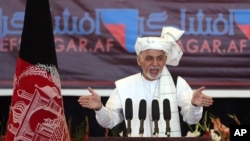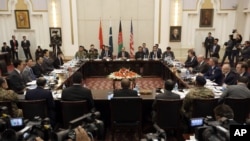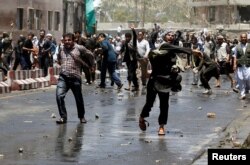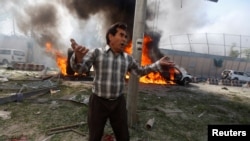Afghanistan’s beleaguered president, Ashraf Ghani, will host an international conference Tuesday in a fresh bid to develop “wider consensus” on how to end an increasingly deadly conflict in the country and collectively fight cross-border terrorism.
The government has named its new regional peace initiative “the Kabul Process" conference but the first meeting is taking place amid worsening national security and deepening political tensions.
Foreign Ministry spokesman Ahmad Shakeb Mustaghani told reporters Monday that authorities are determined not to allow domestic challenges to hamper their efforts.
He said Afghanistan’s neighbors, such as Iran and Pakistan, are among the confirmed participants. The spokesman also said others taking part include the United States, Russia, India, Saudi Arabia, Qatar, the United Arab Emirates, Britain, the United Nations and European Union.
“And our security institutions have also assured the government of putting enough security measures in place in order to ensure the security of this meeting,” said Mustaghani.
Events of the past week, however, have overshadowed what is being described as a key step toward promoting Afghan peace and security.
Two suicide bombings and deadly anti-government protests in Kabul have killed nearly 120 people and wounded around 600 more. The bloodshed started with a massive truck bomb explosion that ripped through the diplomatic section of the capital on Wednesday, May 31.
No group has claimed responsibility for the either attack, but analysts say they may mark a turning point.
“The attack was so large that it changed the situation qualitatively," Zalmay Khalilzad, a former U.S. ambassador to Afghanistan and Iraq told VOA. "So many Afghans were killed and injured it cannot be treated as business as usual. Afghanistan should no longer have patience for such action."
The violence outraged residents and political opponents who took to the streets to demand Ghani resign. Several demonstrators were killed Friday in clashes with security forces.
Political divisions
Foreign Minister Salahuddin Rabbani, head of a major party in the ruling coalition, Monday linked his cooperation with the Ghani government to the removal of heads of all security institutions, including the national security adviser.
He maintained they all failed to prevent the violence and fired at innocent protesters.
“There is no doubt that the situation, both political and security situation in particular, is not good. The inhuman terrorist act that took place on Wednesday...is a clear example that there is a big problem with the heads of the security institutions. They should be removed,” Rabbani said.
On Saturday, the foreign minister and key members of his Jamiat-e Islami party, including Afghan Chief Executive Abdullah Abdullah, were attending the funeral of one of the victims of the deadly protests when a triple suicide bombing struck the service.
Most of the top leaders miraculously escaped unharmed, but an angry Rabbani, in a press conference, accused elements within the coalition government of playing a role in facilitating the attack.
Presidential spokespeople, without directly responding to Rabbani’s accusations, dismissed them as "politically" motivated, saying a high-profile investigation into the violence is under way and the government urges all parties to await the outcome.
Pakistan Blame
While Afghan governing partners are locked in political confrontation, the state intelligence agency (NDS) has accused the Haqqani network, a key Taliban ally, of plotting Wednesday’s suicide bombing in cooperation with Pakistan’s spy agency (ISI).
Islamabad has rejected the charges as baseless and unfounded, saying Pakistan “in the strongest terms” has condemned the Kabul terrorist attack. He also dismissed allegations that Taliban insurgents are using Pakistani soil for orchestrating the violence.
Instead of indulging in a blame game, Afghans must share evidence with Pakistan so it could take “the required action,” said foreign policy advisor, Sartaj Aziz, on Sunday.
“This accusatory approach is instigated by those who have no interest in peace and stability in Afghanistan and their malicious agenda is to damage Afghanistan-Pakistan relations and the cooperation initiatives recently gaining momentum,” Aziz asserted.
Attacks highlight need for talks
While some in Afghanistan rejected holding talks immediately following the brutal attacks, Barnett Rubin, associate director of the Center on International Cooperation at New York University and writer of several books on Afghanistan, said the situation highlights the need for dialogue.
“You hold peace conference during a war. War means bloodshed and killing and unpredictable events. There are also many people who want to continue the war. Hence it’s inevitable that peace conference will meet under such circumstances.”
Michael Kugelman, a South Asia specialist at the Woodrow Wilson Center in Washington, said that although last week’s bombing has raised internal political divisions, it could lead to a greater push for a peace deal.
"The attack underscores just how horrible things are and that reconciliation is the only way forward to bring an end to the constant bloodshed in Afghanistan…The situation on the ground is growing increasingly critical, and clarity about U.S. plans has never been more necessary," Kugelman said.
The extent of the U.S. role in Afghanistan has been under review by the Trump administration, which is expected to announce its strategy soon.







